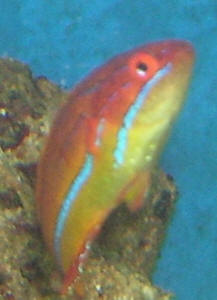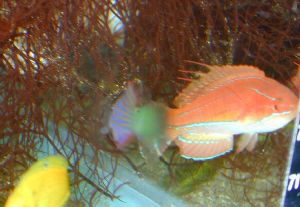|
FAQs on Flasher Wrasses, Genus Paracheilinus
Reproduction
Related Articles: Flasher Wrasses,
Related FAQs: Flasher Wrasses, & FAQs on:
Flasher Wrasse Identification,
Flasher Wrasse Behavior, Flasher Wrasse Compatibility, Flasher Wrasse Selection, Flasher Wrasse Systems, Flasher Wrasse Feeding, Flasher Wrasse Disease, & Wrasses, Wrasse Selection, Wrasse Behavior, Wrasse Compatibility, Wrasse Feeding, Wrasse Diseases,
|

|
McCosker's Flasher Wrasse Female To Male
Change -- 02/01/11
Hello WWM crew!
<<Hiya Becca!>>
I have a 150L aquarium that until recently has been stood empty after a
nasty white spot outbreak (fallow for approximately 3 months).
<<I see>>
Last week I added a pair of yellow coral gobies who I love but they
looked a little lost in the tank so I decided to get them some company
in the form of a trio of McCosker's flasher wrasses.
<<Mmm, this tank is too small for the wrasses really. While
though a smallish fish, and though one that doesn't require a large
environment in which to roam like say a Tang species would, 150L/40g
U.S. is still a bit small here given their penchant for aggression
among conspecifics. And to make matters worse, this fish does better,
in my experience, in a group of 5 or more. A 'trio' just
doesn't allow for enough spreading of aggression among the group.
These little wrasses are also notorious jumpers'¦a behavior
only exacerbated by 'too-small' confines>>
The LFS gave me a ring this morning to let me know they had got the
fish in for me, when I went to see them they were all swimming happily
together and munching on flake and frozen Mysis. Looking at them now I
am afraid I may have ended up with 2 males rather than 2 females, one
of the males is almost fully grown compared to the other who is the
same size and colour as the female but I noticed that he had an
elongated section on his dorsal fin the same as my big male.
<<Ah yes'¦ You likely have a sub-adult male in the
group>>
I can't get a picture at the moment as he will not stay still but I
will keep trying. Now finally getting down to my question, will they
all still get on or will one of them have to go?
<<Odds are the dominant male will not tolerate the younger
male'¦especially in such close confines>>
I have read that some males will be subordinate, or that the female to
male change can be halted by the presence of a dominant male.
<<This is true. And perhaps if this system were
larger'¦'¦'¦'¦>>
How can I tell if the smaller wrasse is in the process of becoming a
male or if he is fully male already? (Probably going to be a really
obvious answer isn't it!)
<<Compare its appearance to the larger male (color/color pattern,
finnage)>>
If I do have to get rid of a male would you suggest another female or
try to leave the pair as it is?
<<These are a 'haremic' species. Four or more females per
male'¦and a larger tank'¦are your best
option>>
Thanks for your time, sorry for carrying on so long!
Becca
<<No worries Becca, happy to share. Cheers'¦
EricR>>
Re: McCosker's Flasher Wrasse Female To Male Change --
02/02/11
Hello again,
<<Hiya Becca>>
Thanks for the quick reply.
<<Quite welcome>>
I think I will give my cousin a ring and ask if he wants them for his
tank (500L).
<<A much better solution>>
By the sounds of it they will be much happier in there than in my
tank.
<<Indeed>>
Would the sub adult male be ok to go with the other two or is it best
for me to take him to my LFS?
<<I would seek to exchange the young male for a female, if
possible>>
May see if he's willing to trade me his rather nice ornate leopard
wrasse for them!
<<Ah Becca'¦you may be going from the frying pan in to
the fire. Before deciding, please read here and among the associated
links: http://www.wetwebmedia.com/macropharyngodon.htm
>>
Becca
<<EricR>>
Paracheilinus McCoskeri - protogynous
hermaphroditism 12/21/10
Hi there,
Can Paracheilinus mccoskeri revert to females from a male or
"partially" male state?
<No; under normal conditions it's a one-way process, though some
female-to-male transitions may be only partial if the fish in question
is being socially suppressed by dominant males in the group or
school.>
There's certainly a gradient along which the transformation takes
place and I've seen fully male, fully female, and many in-between
fish,
<Yes.>
but presuming that three healthy in-between specimens were placed into
a suitable environment (but in proximity so that they interact
socially), would one of them turn "fully male" and the other
two "fully female"?
<No; one would become a male, and likely bully the others into
submission, stopping them from transitioning from female to male any
further.>
I can't seem to find this info anywhere but it strikes me that if
it's possible it would have happened in someone's tank
already.
<Male to female sex changes in wrasses have been triggered under lab
conditions through the use of hormones this doesn't happen under
wild or normal aquarium conditions.>
Thanks!
Victor
<There is some evidence wrasse employ a "sneaker male"
strategy in some situations, where males unable to assert dominance
within a group adopt female colouration. In this way they avoid being
bullied by the dominant males, and while they can't effectively
court females, they can at least get close enough to shed their sperm
over the eggs of a female mating with a dominant male. With luck, at
least a few sperm will fertiliser the female's eggs before the
dominant male notices what's happening and chases the sneaker male
away. Use of Google Scholar will turn up some interesting articles if
you search for wrasse, sex, and change in the search box.
Cheers, Neale.>
Re: Paracheilinus Mccoskeri - protogynous hermaphroditism
12/29/10
Thanks Neale!
<Glad to help! Cheers, Neale.>
Filamented Flasher Wrasse Spawning
6/29/09
Hi!
<Hello Debbie>
I was able to watch with delight tonight my male filamented wrasse with
one of the females do their little dance. They would touch noses, swim
together and then separate, and did the same routine 3 to 4 times. The
last time she released a large white cloud into the tank... under the
Vortech... which rapidly dispersed the eggs throughout the tank.
<Neat!>
My cleaner shrimp were the first to react to the new food. Probably no
chance of anything settling in my refugium and growing huh?
<Very unlikely.>
Everything I've been reading states that wrasses need a tall, very
tall aquarium to do this, but my tank is only 17" tall minus
2-3" of sand minus 1" from the top. Are the needs different
between species of wrasses as to how much room they need?
<You did not mention your actual tank size, but a couple of these
wrasses should do well in a minimum tank size of 30 gallons. As far as
"needs", this will depend on the adult size of the wrasse.
Your wrasses do not exceed four inches in the wild, and likely less
under captive conditions.>
The male starts his flashing/girl chasing routine the same time every
night when the "dusk/dawn" lights go off and only the
actinics are on. If I can get pictures or video of the next spawning
event
I'll be sure to share.
<We would love to see some pics.>
Thanks,
<You're welcome. James (Salty Dog)>
Debbie
| Sexing a Carpenter??? Hello again Crew, I
have not received a response to my previous question regarding
carpenter wrasses, so I am re-sending the email in case it might
have been lost in cyberspace. I also found a picture of a juvenile
and adult carpenter wrasse (attached) since sending my original
email. So hopefully this will help to identify my fish. I am not
even certain I have a carpenter wrasse now (it was nipping at my
clam mantle a few days ago) so any help with identifying the fish
and its sex is certainly appreciated! --Greg <Please see here:
http://www.wetwebmedia.com/paracheilinus.htm
Looks like a male carpenteri to me. Bob Fenner> |
|

| Re: Sexing a Carpenter??? Bob, Thank
you for the prompt reply! I would like to add a female
carpenter wrasse to my 180g aquarium, which already contains
a male (based upon your feedback below). Assuming I am able
to finally locate a female, is it likely that these two
fish would live together peacefully or would they fight?
Since my LFS has been unable to locate a female (or even
differentiate them from males), is it possible that a male
would turn to a female if placed in a tank with another
male? <In this size, shape tank should get along
fine... you could add two or more females> One last
clarification: From the attached picture, it appears that the
juvenile carpenteri is primarily red in color, whereas the
adult is primarily yellow. Is this the best method of sexing
these fish (yellow vs. red) and does "Adult"
necessarily indicate a male in the attached photo? I did view
the WWM page you recommended -- nice pics! <Mmm, take a
look at this species, others of the genus on fishbase.org.
When you left click on the primary image per species, it
brings up all their pix and a link to Google images... There
is quite a bit of variability in these wrasses. Bob
Fenner> |
|
| McCosker's flasher wrasse, breeding
2/2/07 Bob- First and foremost I think your book
is the best on the market. <Thank you. Much good
help with it> I often refer to it when I need
answers. I also frequent La Jolla being from
Phoenix, Arizona and was delighted to hear of your affiliation with
the Scripps. <Mmm, more of an old-timey
one than with the fabulous present Birch> I go there every time
we go to La Jolla. <What a location, eh!? What a view!> My
question is have you ever heard of anyone having success
at breeding flasher wrasses? <Mmm, no... in fact, though
they're such a vast/diverse family... with many smaller,
beautiful species of interest to aquarists, I have
"heard" of exceedingly few attempts at such>
I have a mated pair of McCosker's flashers
and would like to perhaps try to get them to have
babies. Any tips? <Mmm, really to (maybe when you're in San
Diego again... contact me and I may join you on the venture), to
make a sojourn to a large/college library... there's one (a
treasure) down next to SIO... their library I mean... where I/we
can "do" a computer search bibliographic search for such
information. I would take a look see at Ron Thresher's (see
Amazon.com maybe) general work on marine fish reproduction... but
very likely you'll need/want to study re rearing
techniques/technology and food culture methods. Bob Fenner>
McCosker's flasher wrasse 2/9/07 Thanks Bob> I will let you
know when we'll be in town. I also have
an extra Sea World ticket! Ha! Ha! <Wow! The big money... I have
some passes and discount for parking at the Stephen Birch...> I
have attached a picture of the wrasses. I
think they're beautiful!! <Oh yes. BobF> |
|

|

